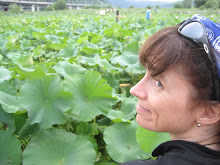





The highlight of my recent trip to Laos was an open topped, long-tail boat trip down the Nam Tha River towards the Mekong. My friend Mairi and I hired a Green Discovery Tours guide and two boatmen to take us on this adventure. A breeze along the river broke the intense heat. Banana tree leaves bent towards the water as the strong current pushed us along. I realized that I had seen this type of scene before-boats pulling away from the small town landing towards the lush trees and jungle along a remote river-but that no film or travel show had quite captured the intensity and size of the towering green trees. Also, Western movies often depict a remote river with a sense of foreboding and danger. But all we saw was beauty and all we felt was appreciation. The further away we journeyed from the town, the more animals traversed the river bank.
Laos is much more ethnically diverse than Korea. Our guide took us to three villages along the river route, and we met three different types of Lao Theong ("upland Lao" or Hill) people. According to our guide, we met people from the Khamu, Lamet, and Thai Dam or, Black Thai ethnic groups. The upland Lao peoples have generally had a lower standard of living than their richer neighbors to the south, the Lowland Lao. In the Khamu village, we saw grandmothers caring for many children, while their mothers went off to work in the forests or on the newly thriving rubber plantations. There is a bit of a battle brewing in Northern Laos-between the people who see the region's future lying in conservation and ecotourism, and between the government officers who are pushing the idea of developing rubber plantations. The Chinese will pay good money for rubber in the short-term. Of course, ecotourism is a better plan for the long-term. If the rubber promoters win out, the Nam Tha river region will look very, very different ten years from now.
The village children looked thinner than the children in the towns, and some had discoloration around their eyes. In the Khamu village, a friendly craftswoman presented us with welcome gifts (handmade embroidered purses) and then attempted to sell us some of the handmade paper she creates. I felt bad that I could not purchase any, but the money changing places only give out large bills, and the paper cost less than a dollar. I was traveling on a budget, and I did not want to haggle with so poor a family over change. Traditionally, they have had bilateral inheritance patterns in Laos. Even if rural Lao women can inherit some of the family land, they still seem to have very difficult lives.
Back on the river, bird songs echoed. The water itself was a brown-green with strong currents pushing fallen tree branches ahead. At one point we passed a happy group of children diving from a large tree into the river to cool off. They were very happy to practice the few words of English that they knew, calling "Hello?" and "OK? OK!" after us as we rode by.
We stopped for a quick lunch on a rock by the riverside. Our guide spread out a banana leaf as a picnic cloth. Then he laid out balls of sticky rice wrapped in what appeared to be grape leaves-one leaf full of rice for each person. Then he laid down the main dishes-a spicy pork and vegetable dish, mixed vegetable dish, and some rice cakes. We washed our hands, and then broke off chunks of the sticky rice. We dunked it right into the pork and vegetable dishes to sop up the sauce and meat-as if they were biscuits. A few minutes into the lunch two large brown pigs and a family of chickens sauntered towards us, intrigued by the smell. One pig tried to nuzzle his way into our lunch-but one of the boat man scared him off. The chicks pecked at the ground around us for stray grains of rice. The pigs didn't go far, but waited in the nearby bushes to see if we would leave any scraps.
In the afternoon, as the sun rose to it's highest point, the heat and humidity did start to get to me. I drank a lot of water, my stomach still started to get queasy. Nevertheless, I was sad when we left the arching trees behind us and floated towards the boat landing.


No comments:
Post a Comment